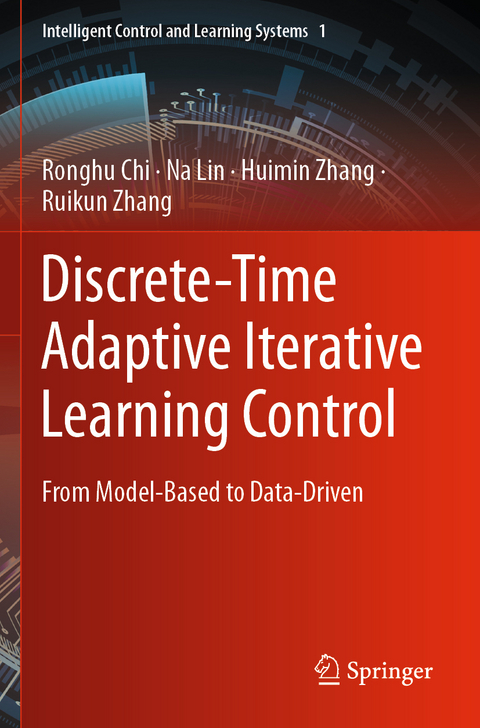
Discrete-Time Adaptive Iterative Learning Control
Springer Verlag, Singapore
978-981-19-0466-0 (ISBN)
Ronghu Chi received the Ph.D. degree from Beijing Jiaotong University, Beijing China, in 2007. He was Visiting Scholar with Nanyang Technological University, Singapore, from 2011 to 2012 and Visiting Professor with University of Alberta, Edmonton, AB, Canada, from 2014 to 2015. In 2007, he joined Qingdao University of Science and Technology, Qingdao, China, and is currently a full professor in the School of Automation and Electronic Engineering. He served as various positions in international conferences and was an invited guest editor of International Journal of Automation and Computing. He has also served as a council member of a Shandong Institute of Automation and the deputy director of the technical committee of Data-driven Control, Learning and Optimization Professional Committee, etc. He was awarded the “Taishan scholarship” in 2016. His current research interests include iterative learning control, data-driven control, intelligent transportation systems and so on. He has published over 100 papers in important international journals and conference proceedings. Na Lin received the M.Sc. degree in automatic control from the Qingdao University of Science and Technology, Qingdao, China, in 2017, where she is currently pursuing the Ph.D. degree in automatic control with the Institute of Artificial Intelligence and Control, School of Automation and Electronic Engineering. Her current research interests include data-driven control and iterative learning control. Huimin Zhang received the bachelor's degree in electrical engineering and automation from University of Jinan, Jinan, Shandong, China, in 2017. She is currently pursuing the doctoral degree with the Institute of Artificial Intelligence and Control, School of Automation and Electronic Engineering, Qingdao University of Science and Technology, Qingdao, China. Her research interests include data-driven control, iterative learning control, networked system control, and data quantization methods. Ruikun Zhang received his B.S. and M.S. degrees in applied mathematics from Qingdao University, Qingdao, China, in 2003 and Zhejiang University, Hangzhou, China, in 2006, respectively. In 2006, he joined Qingdao University of Science and Technology and is currently an associate professor in the school of mathematics and physics. In 2016, he received the Ph.D. degree from Beijing Jiaotong University, Beijing China. His research interests include iterative learning control, robust control, and adaptive control.
Chapter 1: Introduction.- Part 1: Model-based Discrete-time Adaptive ILC.- Chapter 2: Discrete-time Adaptive ILC for Linear Parametric Systems.- Chapter 3: Discrete-time Adaptive ILC for Higher order Parametric Systems.- Chapter 4: Data-weighted Discrete-time Adaptive ILC Chapter.- 5: Discrete-time Adaptive ILC for Nonparametric Nonlinear Systems Part 2: Data-driven Discrete-time Adaptive ILC Chapter.- 6: Neural Network based Discrete-time Adaptive ILC.- Chapter 7: Data-driven Discrete-time Adaptive ILC for Nonaffined Nonlinear Systems.- Chapter 8: Multi-input Enhanced Data-driven Discrete-time Adaptive ILC.- Chapter 9: High-order Internal Model based Data-driven Terminal Adaptive ILC.- Chapter 10: Conclusions Appendices
| Erscheinungsdatum | 25.03.2023 |
|---|---|
| Reihe/Serie | Intelligent Control and Learning Systems |
| Zusatzinfo | 72 Illustrations, color; 11 Illustrations, black and white; X, 206 p. 83 illus., 72 illus. in color. |
| Verlagsort | Singapore |
| Sprache | englisch |
| Maße | 155 x 235 mm |
| Themenwelt | Mathematik / Informatik ► Informatik ► Theorie / Studium |
| Mathematik / Informatik ► Mathematik ► Angewandte Mathematik | |
| Technik ► Elektrotechnik / Energietechnik | |
| Schlagworte | Adaptive Iterative Learning Control • Discrete-time systems • Iterative Learning Control • Linear Parameterized Systems • MIMO Systems • Nonlinear Affine Systems • Nonlinear and Non-affine Systems • Nonlinear Parameterized Systems • SISO Systems • system uncertainties • Terminal Iterative Learning Control |
| ISBN-10 | 981-19-0466-9 / 9811904669 |
| ISBN-13 | 978-981-19-0466-0 / 9789811904660 |
| Zustand | Neuware |
| Haben Sie eine Frage zum Produkt? |
aus dem Bereich


